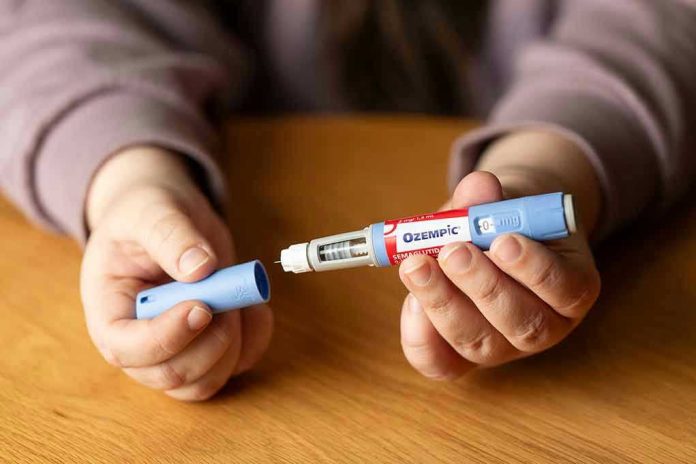🔴 Website 👉 https://u-s-news.com/
Telegram 👉 https://t.me/usnewscom_channel
A presidential deal promises to slash drug prices but reveals critical flaws in eligibility and long-term viability.
Story Highlights
- President Trump announces a deal to reduce GLP-1 drug prices, including Ozempic.
- Price cuts aim to lower costs from $1,350 to $250 per month for eligible patients.
- Legal challenges and limited eligibility threaten the deal’s impact.
- Experts warn that the deal alone cannot resolve the obesity crisis.
Trump’s Drug Price Reduction: What’s at Stake?
On November 7, 2025, President Donald Trump unveiled a pivotal agreement with pharmaceutical giants Eli Lilly and Novo Nordisk to cut costs for GLP-1 weight loss drugs, notably Zepbound and Wegovy. This deal aims to make these drugs more affordable by reducing monthly expenses from $1,350 to $250 for eligible Americans. However, questions linger about the deal’s effectiveness due to its limited eligibility and the looming threat of legal challenges from compounding pharmacies.
The deal’s announcement takes place amidst growing demand for GLP-1 medications, initially designed for diabetes but now popular for weight loss. Rising obesity rates and public pressure have pushed the Trump administration to negotiate these price cuts. Yet, the pharmaceutical industry faces scrutiny over pricing practices, and the deal’s limitations may hinder its intended benefits.
Legal and Regulatory Hurdles
Despite the potential for substantial cost savings, the agreement is mired in legal complexities. Ongoing lawsuits by Eli Lilly and Novo Nordisk against compounding pharmacies raise concerns about access to non-branded alternatives. These legal battles, centered on patent infringement and safety issues, could limit the availability of these drugs, undermining the deal’s impact. Consequently, the sustainability of these price reductions remains uncertain, with the risk that manufacturers may seek to offset losses in other areas.
Medical experts also caution against viewing GLP-1 drugs as a standalone solution for obesity. Dr. Céline Gounder emphasizes that while effective, these medications must be part of a broader strategy addressing lifestyle and systemic factors. The medical community calls for comprehensive public health approaches to tackle obesity, beyond pharmacological interventions.
Implications for Patients and the Healthcare Sector
In the short term, eligible patients may experience reduced drug costs, potentially increasing access to effective weight loss treatments. However, the long-term effects on the healthcare system and pharmaceutical pricing models are less clear. If successful, the deal could drive changes in insurance coverage and influence future drug pricing negotiations. Politically, Trump’s involvement sets a precedent for direct presidential intervention in drug pricing, highlighting the administration’s commitment to addressing public health challenges.
Trump’s Ozempic Deal Has a Major Flaw https://t.co/86lV6FwAXT
— Content Carnivores (@ContentCarnivor) November 7, 2025
As the situation unfolds, stakeholders across the healthcare landscape, including patients, providers, and industry players, will closely monitor the implications of these developments. The outcome of ongoing legal disputes and the broader response from the pharmaceutical industry will be crucial in determining the deal’s ultimate effectiveness in making weight loss medications more accessible and affordable.
Sources:
Trump Announces Major Price Cut for Ozempic, Wegovy
Trump Announces Major Price Cut for #Ozempic, #Wegovy
